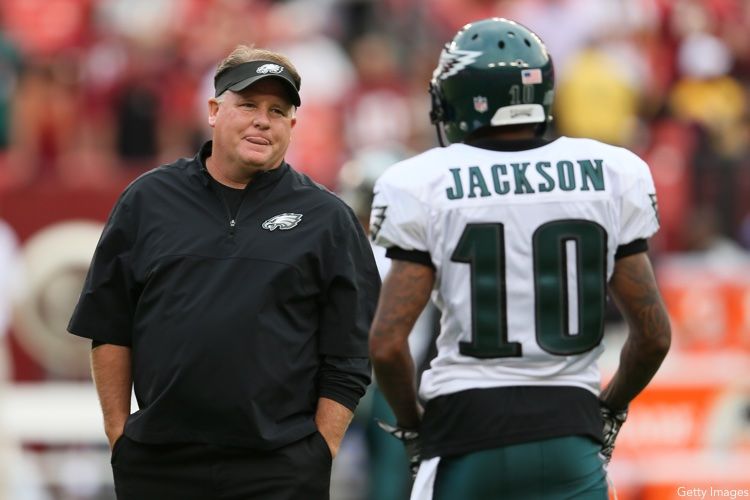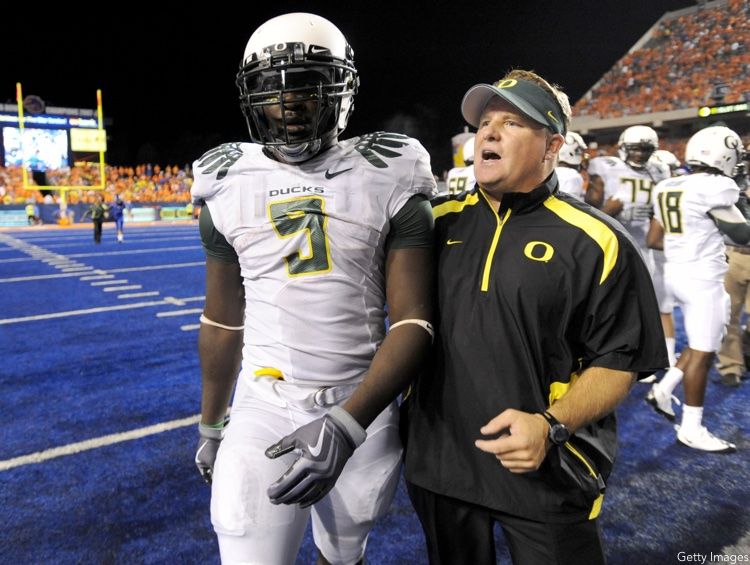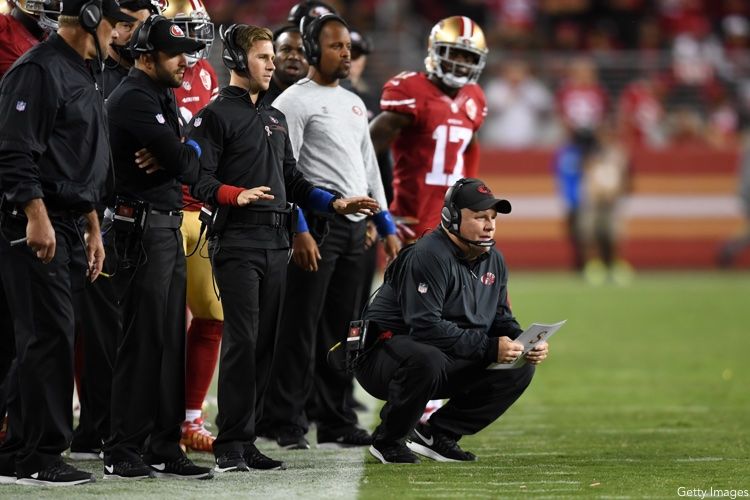One year ago, Chip Kelly had a reputation as a racist coach. Some former Eagles like LeSean McCoy claimed he was unable to connect with, and thus got rid of, black players. But this season, as 49ers coach, Kelly might be the most important ally to the most important civil-rights movement in sports in the 21st century.
One of the most underplayed plot lines from Colin Kaepernick's national-anthem protest saga is how Kelly's backing of his quarterback is the opposite of that Philadelphia perception -- and also consistent with the reputation he had while coaching Oregon.
At Kelly's press conference Thursday, with a divisional battle at Seattle looming, he "aggressively supported" Kaepernick, as described by the San Francisco Chronicle.
"You look at what's gone on in Tulsa and in Charlotte the last two nights, it's an issue that's at the forefront of our country," Kelly said. "And it needs to be addressed and be taken care of because what's going on is not right. So I think, again, he's shedding light on a situation that is heinous. And shouldn't happen in this country.
"We all have inalienable rights as a citizen and this country and they’re being violated. And I think that's what Colin is standing up for."
A reporter then claimed that Kaepernick was "taking over a room" by talking about his protest after the 49ers' win over the Rams in the season opener.
Chip Kelly and reporter have a back-and-forth on Kaepernick's activism (via @SakamotoRyan) pic.twitter.com/Tw0dTdVelm
— Kevin Jones (@Mr_KevinJones) September 22, 2016
"When he's asked a question, I think he should answer what his feelings are on those questions," Kelly said. "If you don't think that's the thing, then maybe you shouldn't ask him those questions."
"We have a fundamental disagreement then," the reporter answered.
"That's a great thing about this country, isn't it?" Kelly said.
Wait a second. Let's put this scenario in context with the comments from some former Eagles:
In April 2015, LeSean McCoy said, "He wants the full control. You see how fast he got rid of all the good players. Especially all the good black players. He got rid of them the fastest. That's the truth. There's a reason."
In August 2015, Brandon Boykin, said Kelly is "uncomfortable around grown men of our culture."
And in March 2015, ESPN's Stephen A. Smith said, "Chip Kelly makes decisions over the last couple of years that, dare I say, leave a few brothers feeling uncomfortable."
Yet, on Thursday, there was Kelly praising the civil-rights effort of his black backup quarterback. In fact, Kelly has been at this since Kaepernick's protest became news in August, saying, "We recognize his right to express his feelings," during the preseason and adding just before opening night, "Any time there's conversation about injustices in this country, it's a positive."
In fact, Chip Kelly has been doing this for years, long before he was head coach of the Eagles.

In March 2015, shortly after Smith's First Take tirade, Dave Zirin wrote a column in The Nation, about the cross-country tour he took with Dr. John Carlos in the fall of 2011 to promote the book they had published. Carlos, the 1968 Olympic bronze medalist in the 200 meters, was known for his Black Power salute with gold medalist Tommie Smith.
"Whenever we visited a big-time sports university, we made sure the athletics department was aware of it, just in case they wanted Dr. Carlos to speak to the student-athletes," Zirin wrote. "Some of the smaller programs graciously said yes. The overwhelming majority either did not return our calls or replied with a curt no."
A certain Pac-12 coach was intrigued by the opportunity to learn from a legendary activist.
"We realized that it would take actual courage for a big-time NCAA football or basketball coach to ask John Carlos to address their locker room," Zirin recalled. "Of all the places we visited together, only one asked him to speak to their team and that was Chip Kelly at Oregon. I called Dr. Carlos last night to see what he remembered about the experience, and he recalled how Kelly introduced him to the Ducks as a person of principle and resolve and said that any successful team needs to share those kinds of principles if they want to rise above being ordinary. He remembered that Kelly was passionate in having his players know the history of 1968, and the sacrifices made by Dr. Carlos and his generation of black athletes."
Zirin's column provided some important context about the same Kelly who traded LeSean McCoy, released DeSean Jackson and decided to let Jeremy Maclin leave as a free agent, but kept Riley Cooper, who was caught on video saying the n-word at a concert in 2013.

In San Francisco, Kelly's support of Kaepernick seems consistent with the reputation he had in Eugene. He's backing his players, not just because he coaches them, but because he agrees with them.
Consider the perspective of Dr. Harry Edwards, the famed African-American sociologist and Cal professor, who is a consultant to the Golden State Warriors and 49ers (starting long before Kelly's arrival). In 2009, when Oregon's LeGarrette Blount was suspended for the rest of the 2009 season after an altercation with two Boise State players in Week 1, Kelly called Edwards for advice.
"I was actually up in Oregon for a week, and we talked about LeGarrette and how to get him on a program that, one, would make sure that there was sufficient response to what he he did, but the same time, would get him back up on his feet and in a situation where he was not on the street," Edwards remembers, speaking on a podcast with Zirin, this past March. "Where he became a legitimate NFL prospect, and with some record of having gone back and tried to get back on track. And that's in point of fact what we did. LeGarrette Blount is in the NFL now, principally because of the efforts of Chip Kelly."
In Philadelphia, Kelly again called upon Edwards for help, but this time, it was more personal.
"Even as DeSean and Shady left the building looking back over their shoulder saying, 'Well, Chip doesn't like star black players,' he called and said, 'Harry, how do I handle this?' And I simply told him, there are some things that you can't handle. You simply have to allow them to go, and don't ... how do you prove that it's cold outside? Or how do you prove that it's too warm outside? You can't do it, so you do what you have to do. And then in Philadelphia, let things take their course, which they did, and ultimately he ended up with us.
"He doesn't use me like a lawyer. He doesn't commit the crime and then come to me and say, get me out of this. Before he makes a decision, typically he will call me and say, 'Hey, what are my options?' And that's what he's doing with the 49ers."
Edwards said this long before any Kaepernick protest could have been expected. But it adds up. Why was San Francisco so quick to sign Kelly after his tumultuous tenure in Philadelphia? The 49ers knew his entire history, not just the accusations of racism he faced in Philadelphia.

Last week, John Tortorella, head coach of the now-eliminated Team USA at the World Cup of Hockey, said he would bench any player who did not stand during the national anthem. Likewise, Dallas Cowboys owner Jerry Jones applauded his team for not following Kaepernick's lead during the national anthem in Week 1.
Kelly is not only allowing it, but supporting his viewpoint. And to make things even more interesting, Kelly and Kaepernick's relationship should not exactly be buddy-buddy. Kelly is playing Blaine Gabbert over the former Super Bowl starter.
"When we're here from 8:15 when we get here in the morning until 5 when we leave, he's at every meeting, he's done everything, there hasn't been anything," Kelly says. "'Hey, Coach I need time because I've got this going on' -- he hasn't done that. He understands what his job is and he's balanced it really well, and I think he's managed it really well. He's focused, he's dialed in when we're at practice."
Colin Kaepernick is grabbing the headlines, as he should. But Kelly's role is an interesting one, given the accusations he faced in Philadelphia. Considering his track record, this is not just a PR move. Chip Kelly is doing what he believes is right.
In doing so, he is making others believe in him again.
-- Follow Jeffrey Eisenband on Twitter @JeffEisenband.





